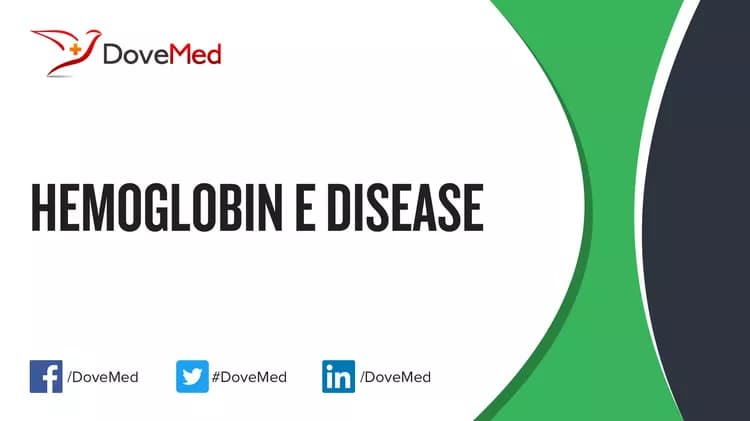What are the other Names for this Condition? (Also known as/Synonyms)
- HbE Disease
What is Hemoglobin E Disease? (Definition/Background Information)
- Hemoglobin E (HbE) Disease is a mild, inherited blood disorder characterized by an abnormal form of hemoglobin, called hemoglobin E
- People with this condition may have very mild anemia, but the condition typically does not cause any symptoms
- Hemoglobin E Disease is inherited in an autosomal recessive manner and is caused by a mutation in the HBB gene
- The mutation that causes Hemoglobin E Disease primarily occurs in Southeast Asian populations, and rarely in Chinese populations
- Most people with HbE Disease do not need any treatment
(Source: Hemoglobin E Disease; Genetic and Rare Diseases Information Center (GARD) of National Center for Advancing Translational Sciences (NCATS), USA.)
Who gets Hemoglobin E Disease? (Age and Sex Distribution)
- Hemoglobin E Disease is a rare congenital disorder. The presentation of symptoms may occur at any age
- Both males and females may be affected
- Individuals of all Southeast Asian descent are the affected by the causative gene mutation for this condition
What are the Risk Factors for Hemoglobin E Disease? (Predisposing Factors)
- A positive family history may be an important risk factor, since Hemoglobin E Disease can be inherited
- Currently, no other risk factors have been clearly identified for this condition
It is important to note that having a risk factor does not mean that one will get the condition. A risk factor increases one’s chances of getting a condition compared to an individual without the risk factors. Some risk factors are more important than others.
Also, not having a risk factor does not mean that an individual will not get the condition. It is always important to discuss the effect of risk factors with your healthcare provider.
What are the Causes of Hemoglobin E Disease? (Etiology)
- Hemoglobin E Disease is a genetic disorder that occurs due to mutation(s) affecting the HBB gene
- It is reported that this disorder is autosomal recessive in nature
Autosomal recessive inheritance: Autosomal recessive conditions are traits or disorders that occur when two copies of an abnormal gene have been inherited on a non-sex chromosome. If both parents have an autosomal recessive condition, there is a 100% likelihood of passing on the mutated genes to their children. If, however, only one mutant copy of the gene is inherited, the individual will be a carrier of the condition, but will not be present with any symptoms. Children born to two carriers, have a 25% chance of being homozygous dominant (unaffected), a 50% chance of being heterozygous (carrier), and a 25% chance of being homozygous recessive (affected).
What are the Signs and Symptoms of Hemoglobin E Disease?
The signs and symptoms of Hemoglobin E Disease, if present, may include:
- Mild anemia
- Microcytosis (a red blood cell size smaller than the normal range)
(Source: Hemoglobin E Disease; Genetic and Rare Diseases Information Center (GARD) of National Center for Advancing Translational Sciences (NCATS), USA.)
How is Hemoglobin E Disease Diagnosed?
The diagnosis of Hemoglobin E Disease is undertaken by the following tests:
- State newborn screening programs
- Looking at the red blood cells by doing a mean corpuscular volume (MCV) test, which is commonly part of a complete blood count (CBC) test
- More specialized tests, such as a hemoglobin electrophoresis and iron studies (these tests indicate whether a person has different types of hemoglobin)
- Genetic testing of the HBB gene to confirm a diagnosis, if needed
(Source: Hemoglobin E Disease; Genetic and Rare Diseases Information Center (GARD) of National Center for Advancing Translational Sciences (NCATS), USA.)
Many clinical conditions may have similar signs and symptoms. Your healthcare provider may perform additional tests to rule out other clinical conditions to arrive at a definitive diagnosis.
What are the possible Complications of Hemoglobin E Disease?
In general, no complications have been reported for Hemoglobin E Disease.
How is Hemoglobin E Disease Treated?
- Generally, no treatment is necessary for Hemoglobin E Disease
- Folic acid supplements may be prescribed to help the body produce normal red blood cells, if mild anemia causes symptoms
(Source: Hemoglobin E Disease; Genetic and Rare Diseases Information Center (GARD) of National Center for Advancing Translational Sciences (NCATS), USA.)
How can Hemoglobin E Disease be Prevented?
- Currently, Hemoglobin E Disease may not be preventable, since it is a genetic disorder
- Regular medical screening at periodic intervals with tests and physical examinations are recommended
What is the Prognosis of Hemoglobin E Disease? (Outcomes/Resolutions)
- The prognosis of Hemoglobin E Disease is good, since most individuals are asymptomatic or only mildly symptomatic
- The condition does not cause any significant complications or affect an individual’s lifespan
Additional and Relevant Useful Information for Hemoglobin E Disease:
The following DoveMed website link is a useful resource for additional information:
Related Articles
Test Your Knowledge
Asked by users
Related Centers
Related Specialties
Related Physicians
Related Procedures
Related Resources
Join DoveHubs
and connect with fellow professionals


0 Comments
Please log in to post a comment.